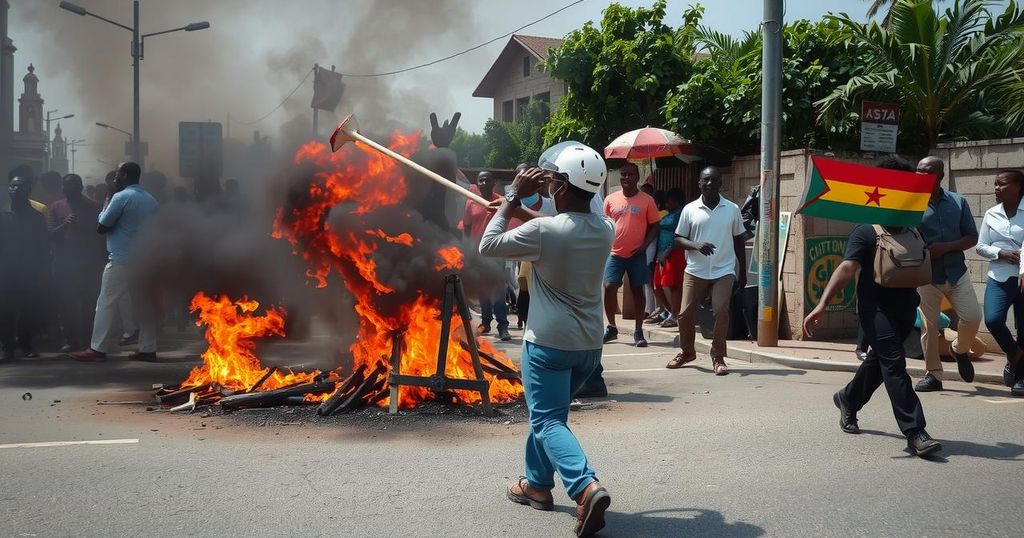Mozambique is engulfed in chaos following the ruling party Frelimo’s confirmed election victory, leading to significant post-election violence that has claimed 278 lives, with urban riots prevalent in Maputo. Thousands have fled the unrest while the economy faces severe disruptions. The situation has escalated tensions, raising concerns about both domestic stability and foreign economic interests.
Mozambique is experiencing significant upheaval following the confirmation of the ruling party Frelimo’s victory in the October 9 elections, which it has held for the past five decades. This has led to severe post-election violence characterized by urban riots predominantly centered in the capital city, Maputo. Reports indicate that in just less than a week, fatalities have reached 176 individuals, with the total number of deaths attributed to unrest since October climbing to 278, predominantly from gunfire, as reported by the local NGO Plataforma Decide.
The unrest commenced after opposition supporters accused the government of electoral fraud, labeling the election as ‘stolen.’ In retaliation, protestors have taken to the streets, resulting in widespread chaos and destruction. Mozambique’s already troubled infrastructure has suffered, with reports of ambulances and local businesses torched, alongside long queues forming at the limited grocery stores still operational amidst the chaos. With escalating violence, approximately 4,200 individuals have been arrested, as the streets of Maputo have become increasingly dangerous with testimonies emerging about missing persons.
In an alarming turn of events, over 1,500 inmates escaped from Maputo’s central prison on Christmas Day, with some later killed in clashes with guards. While a fraction of these escapees has been recaptured, a significant portion remains at large, exacerbating concerns about security in an already destabilized environment. The unrest has also significantly impacted the economy, causing supply chain disruptions that have led to dramatic increases in the prices of basic goods, such as tomatoes.
In the midst of the violence, leaders are calling for calm. President Daniel Chapo urged the citizens for “non-violence” and “unity,” a declaration met with skepticism from opposition leader Venancio Mondlane. He alleged that security forces had incited the looting and violence to instigate a state of emergency. Mondlane, currently in exile, claims that he emerged victorious in the presidential race, despite Frelimo’s official reports showing he received only 20% of the vote. Independent observers have acknowledged significant irregularities.
Furthermore, foreign enterprises have not remained immune to the rising tensions, increasingly becoming targets of protest. Access to essential mining sites has been obstructed, and damage estimates have reached nearly $430 million according to anti-corruption bodies. The unrest has caused thousands to flee Mozambique, significantly impacting the socio-economic landscape of the nation.
The political situation in Mozambique has been historically tumultuous, particularly with the ruling party, Frelimo, maintaining a firm grip on power for fifty years since its independence from Portugal. The recent election is marred by allegations of electoral fraud, leading to the current post-election violence that has spiraled into urban riots. The discontent among the populace has been fueled by increasing economic hardship and significant price inflations, exacerbated by disruptions in supply chains. The ongoing unrest poses serious implications not only for domestic stability but also for foreign investments and regional security.
In conclusion, Mozambique is engulfed in chaos following allegedly fraudulent elections that have ignited violence and unrest across the nation. The situation has resulted in considerable loss of life, economic instability, and a mass exodus of citizens. As authorities confront the violence, the national and international community remains watchful, hoping for a peaceful resolution to the escalating crisis and a return to normalcy for Mozambique’s citizens.
Original Source: international.la-croix.com






